Top 10 Countries Have The Highest Minimum Wage in the World
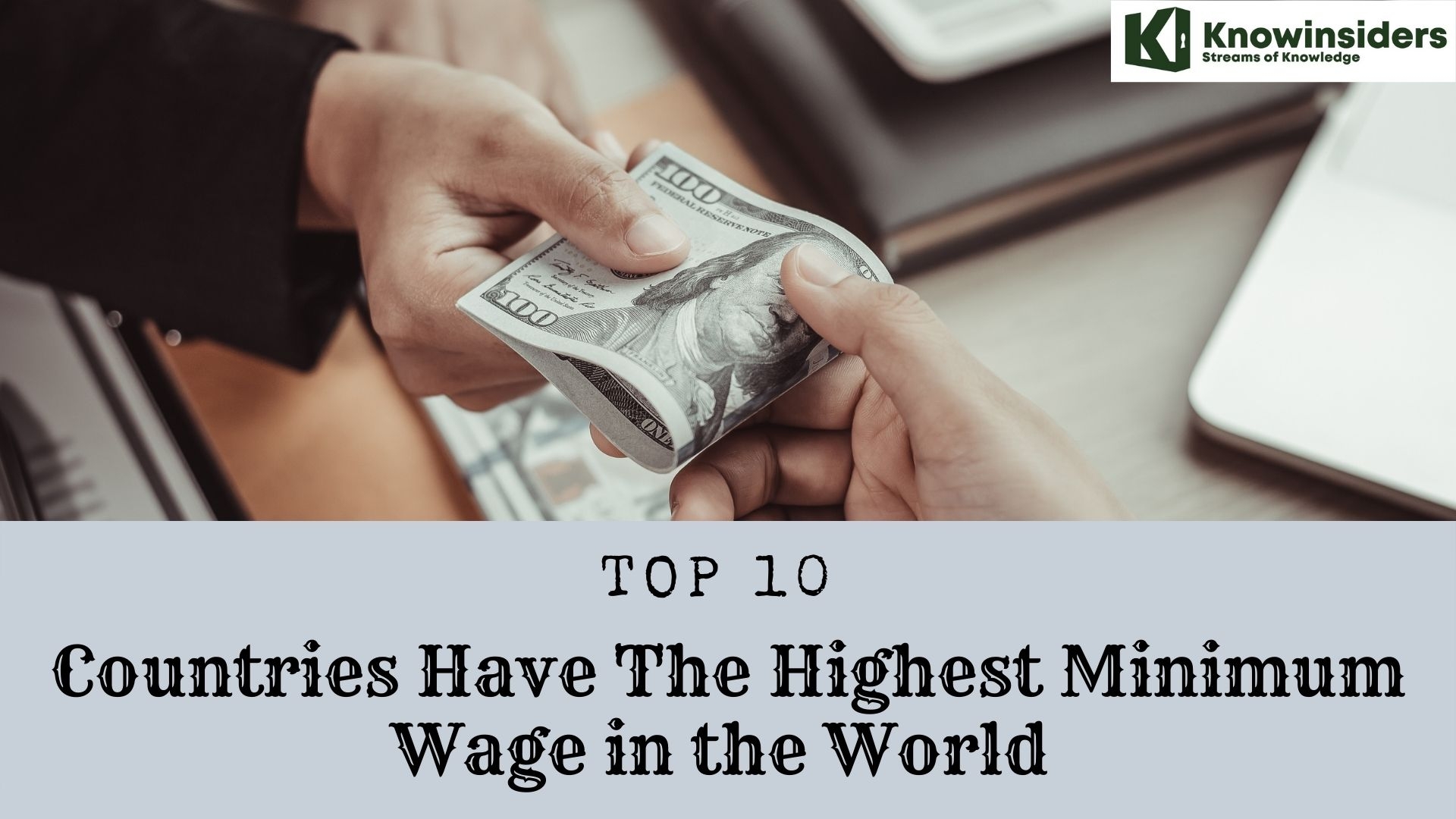 |
| Top 10 Countries Have The Highest Minimum Wage in the World - By UNDP |
The minimum wage is the lowest amount that a person’s employer can pay them for a certain amount of work. Governments usually base the minimum wage on one hour of work, but some countries calculate their minimum wages on daily, weekly, or monthly employment.
There are over 180 countries in the world and this poses slight difficulties in finding out the countries with the best wage structures. Owing to that, minimum wage standards have become the easiest yardsticks in determining the countries with the best wage structures in the world.
By “minimum wage’’, governments fix the lowest wages companies can pay their employees. This is very important to prevent such companies from exploiting their workers or paying them relatively meagre wages.
Here are the top 10 countries with the highest minimum wages.
What is minimum wage (salary)?
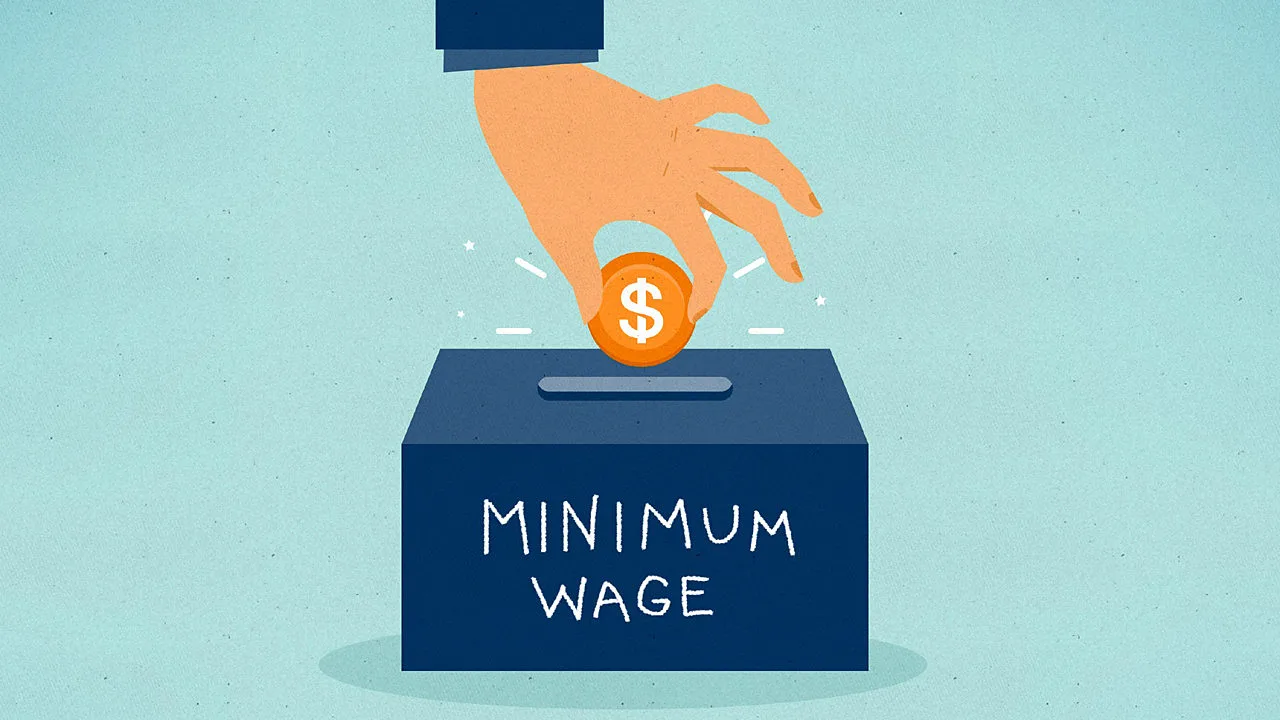 |
| Photo: Westernslopenow.com |
A minimum wage is the lowest remuneration that employers can legally pay their employees—the price floor below which employees may not sell their labor. Most countries had introduced minimum wage legislation by the end of the 20th century. Because minimum wages increase the cost of labor, companies often try to avoid minimum wage laws by using gig workers, by moving labor to locations with lower or nonexistent minimum wages, or by automating job functions.
The movement for minimum wages was first motivated as a way to stop the exploitation of workers in sweatshops, by employers who were thought to have unfair bargaining power over them. Over time, minimum wages came to be seen as a way to help lower-income families. Modern national laws enforcing compulsory union membership which prescribed minimum wages for their members were first passed in New Zealand and Australia in the 1890s. Although minimum wage laws are now in effect in many jurisdictions, differences of opinion exist about the benefits and drawbacks of a minimum wage.
Supply and demand models suggest that there may be employment losses from minimum wages. However, minimum wages can increase the efficiency of the labor market in monopsony scenarios, where individual employers have a degree of wage-setting power over the market as a whole. Supporters of the minimum wage say it increases the standard of living of workers, reduces poverty, reduces inequality, and boosts morale. In contrast, opponents of the minimum wage say it increases poverty and unemployment because some low-wage workers "will be unable to find work...[and] will be pushed into the ranks of the unemployed"
Minimum wage laws
The first modern national minimum wages were enacted by the government recognition of unions which in turn established minimum wage policy among their members, as in New Zealand in 1894, followed by Australia in 1896 and the United Kingdom in 1909. In the United States, statutory minimum wages were first introduced nationally in 1938, and they were reintroduced and expanded in the United Kingdom in 1998. There is now legislation or binding collective bargaining regarding minimum wage in more than 90 percent of all countries. In the European Union, 21 out of 27 member states currently have national minimum wages. Other countries, such as Sweden, Finland, Denmark, Switzerland, Austria, and Italy, have no minimum wage laws, but rely on employer groups and trade unions to set minimum earnings through collective bargaining.
Minimum wage rates vary greatly across many different jurisdictions, not only in setting a particular amount of money—for example $7.25 per hour ($14,500 per year) under certain US state laws (or $2.13 for employees who receive tips, which is known as the tipped minimum wage), $11.00 in the US state of Washington, or £8.91 (for those aged 25+) in the United Kingdom—but also in terms of which pay period (for example Russia and China set monthly minimum wages) or the scope of coverage. Currently the United States federal minimum wage is $7.25 per hour. However, some states do not recognize the minimum wage law, such as Louisiana and Tennessee. Other states have minimum wages below the federal minimum wage such as Georgia and Wyoming, although the federal minimum wage is enforced in those states. Some jurisdictions allow employers to count tips given to their workers as credit towards the minimum wage levels. India was one of the first developing countries to introduce minimum wage policy in its law in 1948. However, it is rarely implemented, even by contractors of government agencies. In Mumbai, as of 2017, the minimum wage was Rs. 348/day. India also has one of the most complicated systems with more than 1,200 minimum wage rates depending on the geographical region.
Informal minimum wages
Customs, tight labor markets, and extra-legal pressures from governments or labor unions can each produce a de facto minimum wage. So can international public opinion, by pressuring multinational companies to pay Third World workers wages usually found in more industrialized countries. The latter situation in Southeast Asia and Latin America was publicized in the 2000s, but it existed with companies in West Africa in the middle of the 20th century.
 |
| Photo: Shutterstock |
Setting minimum wage
Among the indicators that might be used to establish an initial minimum wage rate are ones that minimize the loss of jobs while preserving international competitiveness. Among these are general economic conditions as measured by real and nominal gross domestic product; inflation; labor supply and demand; wage levels, distribution and differentials; employment terms; productivity growth; labor costs; business operating costs; the number and trend of bankruptcies; economic freedom rankings; standards of living and the prevailing average wage rate.
In the business sector, concerns include the expected increased cost of doing business, threats to profitability, rising levels of unemployment (and subsequent higher government expenditure on welfare benefits raising tax rates), and the possible knock-on effects to the wages of more experienced workers who might already be earning the new statutory minimum wage, or slightly more. Among workers and their representatives, political considerations weigh in as labor leaders seek to win support by demanding the highest possible rate. Other concerns include purchasing power, inflation indexing and standardized working hours.
As of 2022, the following ten countries have the highest yearly minimum wage (salary) for full-time work (40 hours per week):
1.Australia – $30,243 ($14.54/hour)
2.Luxembourg – $28,433 ($13.67/hour)
3.New Zealand – $27,414 ($13.18/hour)
4.Monaco – $24,710 ($11.88/hour)
5.Ireland – $24,003 ($11.54/hour)
6.France – $23,837 ($11.46/hour)
7.United Kingdom – $23,649 ($11.37/hour)
8.Netherlands – $23,316 ($11.21/hour)
9.Belgium – $23,004 ($11.06/hour)
10. Germany – $22,214 ($10.68/hour)
(Amounts in parentheses are in United States Dollars or USD).
Top 10 Countries Have The Highest Minimum Wage in the World
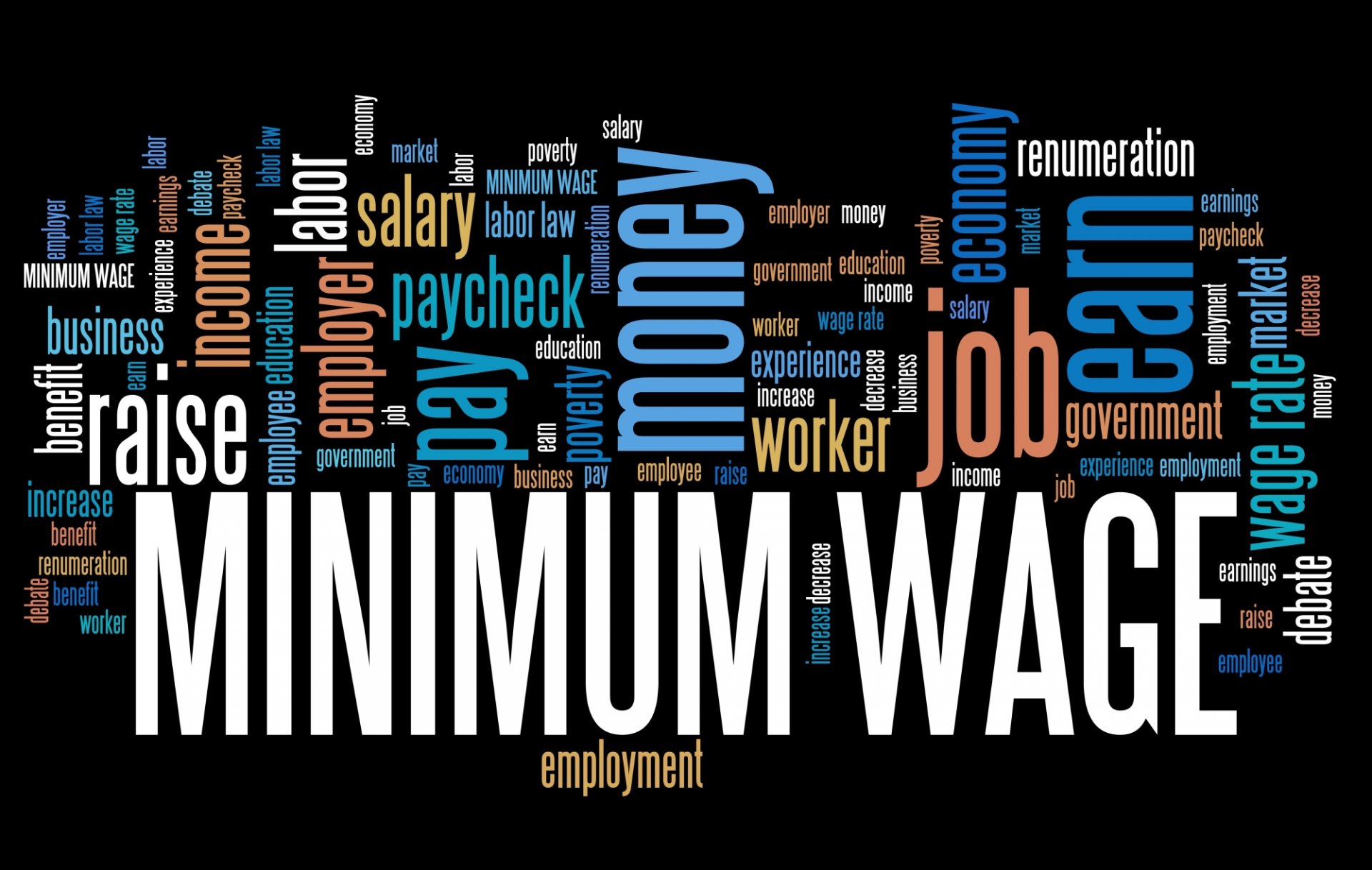 |
| Photo: JPTimes |
1. Australia
Australia maintains the world’s highest minimum wage. As stipulated by the Fair Work Commission under the Australian federal government, the hourly minimum wage in Australia is estimated at $18.29 which is equivalent to the weekly minimum wage of $694.90.
Australian minimum wage rates since 2007
| Commencement Date | Per hour | Per 38 hour week |
|---|---|---|
| 1 October 2007 | $13.74 | $522.12 |
| 1 October 2008 | $14.31 | $543.78 |
| 1 July 2009 | Unchanged | Unchanged |
| 1 July 2010 | $15.00 | $569.90 |
| 1 July 2011 | $15.51 | $589.30 |
| 1 July 2012 | $15.96 | $606.40 |
| 1 July 2013 | $16.37 | $622.20 |
| 1 July 2014 | $16.87 | $640.90 |
| 1 July 2015 | $17.29 | $656.90 |
| 1 July 2016 | $17.70 | $672.70 |
| 1 July 2017 | $18.29 | $694.90 |
| 1 July 2018 | $18.93 | $719.20 |
| 1 July 2019 | $19.49 | $740.80 |
| 1 July 2020 | $19.84 | $753.80 |
| 1 July 2021. | $20.33 | $772.60 |
Australia's economic performance over the last decade makes it a major destination for Irish graduates seeking temporary employment. Although challenged by global events, they were helped by the introduction of a strong fiscal policy and a continued demand for commodities.
Industry sectors
Australia has a large services sector and is a significant exporter of natural resources, energy, and food.
Employment opportunities
Unemployment in Australia has been steady at just under 6% (October 2017).
Although there is still a demand for skilled labour in Australia, higher levels of education and current global economic crisis have meant that there is greater competition for available positions.
Expansion is expected to occur in financial services, telecommunications, biotechnology, IT and e-commerce, engineering and mining, healthcare, retail, recreation, tourism and construction.
Job applications
When you find a job vacancy that is suitable, your application will usually require a covering letter and CV (called résumé in Australia) with details of qualifications and references. In terms of content and layout, an Australian résumé and covering letter is similar to its Irish equivalent.
Your application should focus on the job you are applying for and should be concentrated on your achievements. It should also emphasise your competencies (skills) and contain information on qualifications and work experience.
Temporary work
The majority of Irish students or graduates initially visit Australia on a student or working holiday visa, so the first port of call is the Australian Embassy.
Some jobs are closely tied to particular courses of study and some students tutor schoolchildren or get jobs on campus.
Working holiday makers need a working holiday visa for a year, which must be broken up by periods of holiday or travel. There is also the option of taking advantage of a second visa if you can prove you have worked for a minimum of three months as a seasonal worker.
The main areas of employment for working holiday makers are hospitality, catering, sales, retail, administration, labouring and fruit picking. The latter is traditionally a boom area for casual employment and a good way for overseas workers to see a side of life outside the cities.
For work with employers on a less casual basis, it is advisable to identify suitable employers and contact them directly.
Some organisations run special schemes to help people find short-term work. These generally offer a full package helping with visa, transfers from the airport, accommodation for the first few nights, an orientation programme and help with finding work.
These schemes do charge but often provide people with an instant network of fellow visitors/travellers.
Internships
Participating in an international internship will give you the option of combining your particular area of study with practical, career-related experience. To apply for internships in Australia you can either contact companies directly or avail of the various organisations that can fully or partially arrange placements within companies.
Permanent work
If you are thinking of living and working in Australia on a more permanent basis, you can apply to migrate to Australia through the Australian General Skilled Migration Program. The program is designed to attract skilled migrants who can make an immediate contribution to the Australian economy.
It is divided into three sections: Skilled Independent Visas, Skilled Sponsored Visas and Skilled Recognised Graduates (Temporary) for recent engineering graduates.
Applicants need to have relevant professional qualifications and, usually work experience, to prove that they have the skills to contribute to the economy.
The Department of Immigration and Citizenship has the latest, detailed information about visas.
There are openings for professionals in areas such as civil engineering, architecture and physiotherapy but also shortages of welders, pastry chefs, stonemasons, bricklayers and hairdressers.
There’s always a demand for nurses and there’s a specific programme called Doctor Connect, operated by Australia’s department of health and ageing, to recruit doctors who have been trained overseas.
It may be possible for an Irish graduate working for an international company to work at the Australian 'branch' for some period of time.
Australia is a highly developed country with a market economy. As of 2021, Australia was the 13th-largest national economy by nominal GDP (Gross Domestic Product), the 18th-largest by PPP-adjusted GDP, and was the 25th-largest goods exporter and 20th-largest goods importer. Australia took the record for the longest run of uninterrupted GDP growth in the developed world with the March 2017 financial quarter. It was the 103rd quarter and the 26th year since the country had a technical recession (two consecutive quarters of negative growth). As of June 2021, the country's GDP was estimated at A$1.98 trillion.
The Australian economy is dominated by its service sector, which in 2017 comprised 62.7% of the GDP and employed 78.8% of the labour force. Australia has the tenth-highest total estimated value of natural resources, valued at US$19.9 trillion in 2019. At the height of the mining boom in 2009–10, the total value-added of the mining industry was 8.4% of GDP. Despite the recent decline in the mining sector, the Australian economy had remained resilient and stable and did not experience a recession from 1991 until 2020.
2. Luxembourg
In terms of GDP per capita, Luxembourg is one of the wealthiest countries both in Europe and the entire world. Under the influence of political stability, economic development and favourable national standards, Luxembourg maintain the second-highest minimum wage in the world.
Effective as of January 1, 2018, unskilled employees above the age of 18 in Luxembourg receive the minimum wage of €11.5525. Monthly, this amounts to the minimum wage of €1,998.59. Meanwhile, a skilled worker within that age grade enjoys a 20% increase in the minimum wage. However, in the case of an underaged skilled worker (precisely an adolescent), the minimum wage is marked down by a 20% to 25% decrease.
Job market in Luxembourg
The unemployment rate in Luxembourg has remained relatively stable in recent years, currently sitting at 6.6% in July 2020.
The workforce in Luxembourg is made up of nationals, cross-border commuters, and foreign workers. Luxembourg’s job market is multicultural and multilingual; in fact, working knowledge of one of the three official languages (Luxembourgish, French, or German) is essential for many jobs.
Financial services are at the heart of the economy in Luxembourg, with the transport and communications sectors also performing well. Luxembourg is a leading center in Europe for investment funds and private banking, with around 150 banks operating in Luxembourg.
The biggest employers in Luxembourg in 2019 were:
- Post Luxembourg (telecommunications)
- Groupe CFL (transport)
- Cactus (food retail)
- Groupe Dussmann (security)
- BGL BNP Paribas (finance)
- ArcelorMittal (steel manufacturing)
- Goodyear Dunlop (tire manufacturing)
- Luxair (transport)
Job vacancies in Luxembourg
There are currently no major skills shortages in Luxembourg, but a number of sectors are continuously recruiting at various levels, including:
- finance
- healthcare
- retail
- manufacturing
- construction
- hospitality
Job salaries in Luxembourg
Wages are typically freely determined between an employer and employee in Luxembourg. However, employers must not offer less than the social minimum wage, which increases by 20% if you’re a skilled worker or decreases by 20–25% if you’re an adolescent worker. The social minimum wage adjusts every two years.
The minimum gross monthly salary in Luxembourg for a 40-hour week in January 2020 is:
- 18 years and over, unskilled worker: €2,141.99
- 18 years and over, skilled worker (+20%): €2,570.39
- 17 to 18 years old: €1,713.60
- 15 to 17 years old: €1,606.50
The average gross salary in Luxembourg is €4,916 a month. Luxembourg uses a system of salary indexation, in other words, salaries should be adjusted by the amount that the consumer price index increases or decreases in Luxembourg.
 |
| Photo: Toggr |
Work culture in Luxembourg
The workplace is traditionally hierarchical and decision making is often rational and pragmatic. Punctuality and deadlines are serious business in Luxembourg, in both professional and social contexts.
Meetings tend to be brief and have the purpose of formalizing decision-making that has already been done. In addition to this, dress codes tend to be formal and conservative.
Labor laws and labor rights in Luxembourg
In terms of employment contracts, Luxembourg is similar to other EU countries with permanent contracts (CDI), fixed-term contracts (CDD), part-time contracts, and learning/apprenticeship contracts the norm.
In general, a full-time working week in Luxembourg is 40 hours. The maximum number of hours you can work in a week is 48, plus there is also a daily limit of 10 hours’ work except in special cases.
Each employee in Luxembourg receives 10 public holidays a year, however you can work on these days in return for extra salary. Full-time employees must also receive a minimum of 25 days of paid leave each year.
Notice periods for those on permanent contracts are one month for employees of less than five years, two months for those who have been employed for between 5–10 years, and three months for employees of over 10 years. This is slightly different for those on fixed-term or part-time contracts. Notice periods are also shorter during probation or trial periods.
3. New Zealand
New Zealand’s standard minimum wage is 20 NZD or about 13.18 USD to 13.56 USD. This rate applies to almost every worker in the country.
The main exemption to this rule is that certain employees who are training or just starting out in employment only get 16 NZD (10.85 USD). However, they soon move up to the standard wage after a short time at their job.
Other exemptions have to do with the laws outlined in the Minimum Wage Act of 1983. According to this law, the national minimum wage differs for those under 16 years old and most inmates.
Jobs in New Zealand
If you have the right skills and experience, it's always a good time to look for work in New Zealand. Unemployment is low at 4.3%.
There are currently plenty of job openings in industries such as engineering, IT and medicine - however, there are also opportunities to contribute more general skills.
Recent employment growth has been seen in human resources and recruitment, manufacturing, transport and logistics, trades and services, engineering and community service and development.
Small and medium-sized enterprises (SMEs) account for a huge number of New Zealand businesses, even the country's big businesses are considered small by international standards. Higher education institutions, IBM and New Zealand Air are all popular graduate employers.
Because of competition for jobs, it's not uncommon for international job hunters to accept more junior positions in order to gain experience of working in New Zealand.
Don't limit your options by ruling out contract or part-time work - this can sometimes lead to permanent employment.
POPULAR GRADUATE JOBS
- Agriculture
- Construction
- Financial services
- Manufacturing
- Real estate services
- Tourism
How to get a job in New Zealand
To obtain a visa you'll need to look for and secure a job before moving to the country.
Applications are typically made online with a CV and cover letter. CVs in New Zealand differ in the sense that they rarely list all past jobs, instead they explain the skills you have and provide examples of how you've used them.
If your application passes the first stage you may be offered a telephone interview. Face-to-face interviews tend to be informal and may be led by up to four people. Make sure you've thoroughly researched the position and the company before your interview.
A number of jobs aren't formally advertised, so making connections, networking and applying speculatively can prove useful.
Read More: Top 10 Highest-Paid Leaders In The World: Lee Hsien Loong Get Paid More Than Joe Biden
4. Monaco
Monaco’s current minimum wage is €10.15 or 11.53 USD to 11.88 USD. But, the vast majority of employees make more than this amount.
The median monthly income in the municipality is €4,410 a month (5010 USD), which works out to about €27.56 an hour (31.31 USD). Meanwhile, the top 25% of workers make more than €11,600 a month (13,180 USD), or €72.5 an hour (82.38 USD).
Employment in Monaco
At a Glance:
- Monaco is famed for not charging taxes on its residents’ income, however, this doesn’t mean you will not encounter taxes when living in Monaco.
- Before working in Monaco or setting up a business, a work or business permit must be acquired according to the job you are planning to undertake.
- Whilst working and living in Monaco, you can benefit from various compulsory social security plans for both employees and the self-employed.
An Economic Overview
Taking the country’s small size and lack of natural resources into account, it is hardly surprising that many of those working in Monaco find themselves employed in key sectors such as tourism, finance and insurance, as well as light, high-tech research and industry.
Due to its size, Monaco is highly dependent on other countries and its European neighbors in particular. As such, the principality has also been heavily affected by the Eurozone crisis and related declines in tourism and global trade. Nevertheless, the nation has managed to weather the storm so far, and it achieved a pre-crisis level of GDP in 2012.
Tips for the Job Search
Only about 2% of local jobs were held by Monegasque citizens in 2015, so expats working in Monaco and cross-border commuters are quite common. Nevertheless, when applying for a public service position or otherwise looking for employment, Monegasque nationals, as well as others with close ties to the country (e.g. via marriage), typically enjoy prioritization.
You can start by looking for jobs online at such sites as Job Monaco (French only) or try and send an initiative application to a local company. Kompass offers a directory of registered businesses which you can browse for this purpose. The self-proclaimed biggest employer in the Principality, for instance, is the Monte-Carlo SBM Group, which was employing over 3,000 people in the principality in 2016, and regularly offers open positions in one of their casinos, luxury hotels, restaurants, etc.
How to Get a Work Permit for Monaco
If you are planning on working in Monaco, then you will need a permit de travaiI first. Similarly, your (future) employer needs to apply for permission to hire foreign employees. This is done so that Monegasque nationals, as well as those with close ties to Monaco (e.g. the spouse of a citizen), are prioritized in regard to local jobs. In order to apply for your permit, you need to either:
- hold a valid Monegasque residence card, or
- have a valid French ID or residence document when commuting from France
If you are living neither in France nor in Monaco, you and your employer have to settle the question of your visa and residence status first, i.e. get permission to employ a foreigner, establish the work contract, use the contract to get your visa, and so on. This may also include a medical examination.
Only once your status of residence is settled can you apply for a work permit at the Employment Office. Work permits are also dependent on your job, meaning that if you change employer or position, you will also have to apply for a new permit.
5. Ireland
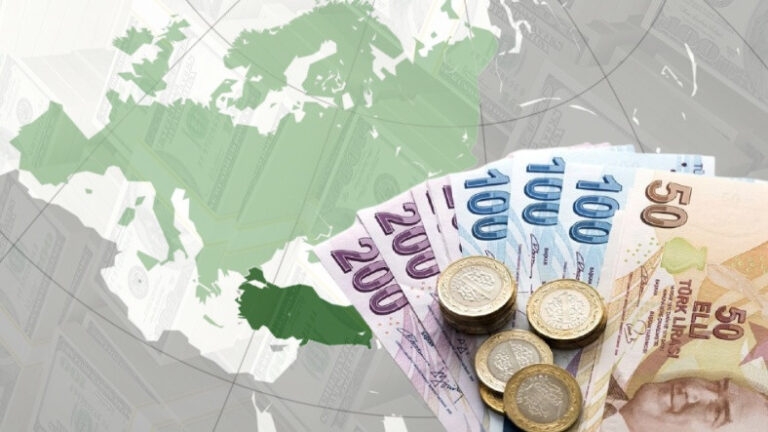 |
| Photo: Getty Images |
In Ireland, the standard minimum wage is €10.50 an hour or 11.54 USD to 11.93 USD. This rate applies to everyone 20 years old or older.
The minimum wages for younger people are:
- 19 years old: €9.45 (10.74 USD)
- 18 years old: €8.40 (9.54 USD)
- 17 years old and younger: €7.35 (8.35 USD)
Also, in Ireland, you can not agree for your employer to pay you less than the minimum wage unless that person is a close relative or you are part of a recognized apprenticeship.
With one of the youngest populations in Europe, graduates hoping to start their careers in Ireland should feel right at home
English is widely spoken and those that live on the Emerald Isle are friendly and welcoming. The country has one of the highest standards of living in Europe and thanks to its well-connected geographical location and low corporation tax rates, an impressive number of multinational companies have European headquarters in the country, providing a wealth of opportunities.
Famous for its history and folklore, working in the country you'll be able to take advantage of everything that the lush green landscapes and metropolitan cities have to offer, and maybe indulge in a Guinness or two.
Job market in Ireland
With the fastest growing economy in the European Union (EU), Ireland is a great option for those on the job hunt.
The service sector dominates the job market. Opportunities can be found in a number of major industries including the growing technology sector, where the demand for IT workers is high, and thanks to Ireland's rising popularity as a holiday destination, the hospitality and tourism industry are in need of both skilled and casual workers.
POPULAR GRADUATE JOBS
- Beverages and brewing
- Chemicals
- Computer hardware and software
- Food products
- Medical devices and pharmaceuticals
The country is also home to several multinational companies, including:
- Apple
- Microsoft
- Ryanair
Competition for skilled jobs is fierce and your chances of securing work will increase with relevant work experience and third-level qualifications. In general work will be easier to come by in major towns and cities such as Cork, Dublin and Galway. While the capital city of Dublin is known to be relatively expensive, the cost of living is cheaper than other major European cities such as Copenhagen, London, Paris and Zurich.
Look for job vacancies at:
- Irish Jobs
- Jobs.ie
- Monster.ie
- RecruitIreland.com
Skill shortages
The Irish economy has skills shortages in a number of areas including:
- Business and finance - accountants, business intelligence analysts, financial advisers, risk and compliance professionals
- Engineering - biomedical engineers, chemical engineers, electrical engineers, energy engineers
- IT - app developers, data analysts, software developers, IT support specialists, programmers
- Healthcare - doctors, nurses, pharmacists, opticians, radiologists
- Hospitality - chefs
- Transport and logistics - logistics and supply chain managers, supply chain analysts, transport managers.
How to get a job in Ireland
You can start applying for jobs in Ireland before heading to the country. While it isn't essential for you to secure a job before arrival, researching, searching and applying for jobs from your home country may give you a head start in the hunt for work.
Application and interview processes are similar to those in the UK. You'll search for vacancies online, in the press and via your networks and contacts and apply for positions with either a CV and cover letter or an online application form. If your application is successful you may be invited for a formal interview.
There may be multiple interview stages. Some recruiters may first offer you a phone interview, and if successful you could then be invited to a face-to-face meeting. You may also have to pass an assessment day/centre for some jobs.
Your CV should be one to two pages long; it's a good idea to include your level of English proficiency if it is not your first language and details of any other languages spoken.
6. France
In France, the minimum wage is €10.03 an hour or 11.40 USD to 11.46 USD. This rate applies to all working adults.
However, the minimum wage is lower if a person is under the age of 18. Employers can pay people 17 years old and younger 90% to 80% of the official minimum wage, depending on work experience. Meanwhile, apprenticeships can pay 25% to 78% less than the minimum wage.
Furthermore, all non-citizens who have a workers permit are entitled to the minimum wage, as in many other countries.
Unemployment in France is currently slightly above the EU and Eurozone averages. According to the National Institute of Statistics and Economic Studies (Institut National de la Statistique et des Études Économiques – INSEE), the French unemployment rate currently stands at 7.1%.
As in many other European countries, unemployment in France is higher among the under-25 age group and there has been a growth of flexible, impermanent work contracts in recent years.
The French government recently announced plans to introduce quotas on migrant workers to control the workforce in certain industries. This will affect migrants from outside the EU/EFTA who usually need a work visa to work in France. EU/EFTA citizens have the same employment rights as French citizens, with the exception of some public administration positions.
Major industries in France include aerospace, automotive, pharmaceutical, industrial machinery, electronics, finance, food and drink, and tourism. Some of the biggest companies based in France include:
- AXA
- BNP Paribas
- Carrefour
- Credit Agricole
- EDF
- L’Oreal
- Michelin
- Orange
- Peugeot
- Renault
- Societe Generale
- Total
Job vacancies in France
There were around 212,000 job vacancies in France as of June 2020.
Shortage occupations in France currently include:
STEM professionals (science, technology, engineering, and math)
electricians
vets
medical professionals
carpenters
construction workers
surveyors
ICT professionals
You can also find many jobs in tourism, retail, agriculture, and the care sector.
Job salaries in France
The French government revises the minimum wage each year. In 2020, it rose to €10.15 an hour from €10.03 in 2019. This places it among the highest out of EU nations.
Salaries in France vary greatly across sectors and skill levels. There are also variations across regions, with big cities such as Paris having higher wages on average. The overall average French salary in 2019 was €39,099.
Work culture in France
In France, businesses have a strong hierarchy with clearly defined positions and power. Secretaries work hard to protect their bosses from disturbances so you will hardly speak directly to people in top positions. Even the seating arrangements around a meeting table will be organized according to rank.
When you’re in a meeting expect to discuss the subject rather than make a decision on it. When decisions are made every aspect will be analyzed extensively beforehand. Strategies tend to be long-term and planned only by senior staff. Punctuality is important, appointments are necessary, and negotiations are calm and formal.
Labor laws and labor rights in France
French labor laws are protective with a statutory working week of 35 hours (after which you get paid overtime), around one to two hours for lunch, and a minimum of five weeks’ holiday a year plus other benefits such as paid parental leave. The maximum number of working hours per week is 48.
If you’re working for a company of more than 50 employees you’ll automatically enjoy the protection of a French employment union, even if you don’t join it. However, written employment contracts are not a legal requirement in France, and employees of smaller firms or those working in casual jobs may not receive one. It’s a good idea to request a written contract as it’s easier to protect your employment rights.
Notice periods in French employment contracts are usually between 1-3 months. Employers need to follow certain procedures and guidelines if dismissing workers, and certain categories of employees (e.g., pregnant women and those on sick leave due to a work-related incident) have special protection aimed at preventing their dismissal.
10 Highest Paying Jobs in the World: Cardiologist vs Anesthesiologist
7. United Kingdom
Overall, the standard minimum wage in the United Kingdom is £8.21 or 11.16 USD to 11.37 USD for anyone 25 years old or older. All employers in the U.K., regardless of sector, must pay at least the minimum wage.
The U.K.’s minimum wage, like many other countries, depends on the worker’s age. For those who are younger than 25 years old, the minimum hourly wage is as follows:
- 21 to 24-year-olds: £7.70 (10.47 USD)
- 18 to 20-year-olds: £6.15 (8.36 USD)
- Under 18 years old: £4.35 (5.91 USD)
- Apprentices: £3.90 (5.30 USD)
Yet, although £8.21 is the least amount of money that a person over 25 years old can get paid an hour, this amount is not actually called the minimum wage in the U.K. Instead, since 2016, employers must pay those 25 years and older the national living wage, which is 50 pence more than the national minimum wage, which applies to those 21-24 years old.
The government reviews the minimum wage every April.
The country's unemployment rate currently stands at a relatively low 4%, and the graduate labour market remains robust and by some measures is as strong as it has been for some time. Competition for graduate jobs is fierce but candidates with the right qualifications, skills and experience stand a good chance of employment.
Language skills are increasingly important, making many foreign nationals desirable candidates. The UK has many international communities, so as a foreign worker you'll be in good company.
With the UK's diverse job sectors, good working conditions and numerous employment opportunities, it's no surprise that it's a popular destination for international graduates wanting to kick start their careers.
Jobs in the UK
The UK is highly globalised, which means that the job market is competitive. Major industries in the UK include:
- accounting, banking and finance
- education
- engineering
- healthcare
- marketing
- recruitment and HR.
The services sector dominates the UK economy with banking, insurance and business services all key drivers of the country's growth. Other important industries include metals, chemicals, aerospace, shipbuilding, motor vehicles, food processing, textiles and clothing, design, the arts and electronic and communications equipment.
In recent years there has been a decline in the manufacturing industry, although it's important to note that this sector still employs a large number of workers.
POPULAR GRADUATE JOBS
- Accountant/Finance manager
- Business analyst
- Data scientist
- HR manager
- Marketing and sales professionals
- Nurse
- Project Manager
- Software developer
- Teacher.
Graduate schemes are available at many of the UK's large and multinational companies, in sectors such as:
- finance
- HR
- marketing
- retail
- sales
Skills shortages
There are currently a number of shortage occupations, including:
- Business services - analysts, market researchers, HR officers
- Construction - surveyors, planners and project managers
- Education - primary and secondary school teachers (particularly maths teachers)
- Engineering - electrical, mechanical and chemical engineers, civil engineers and product and process engineers
- Healthcare - nurses, medical radiographers and paediatricians
- Hospitality - baristas, chefs
- IT - cyber security analysts, SEO marketers, software developers and systems engineers
- Social care - counsellors, social workers.
How to get a job in UK
In the UK you can apply for most jobs online by sending a short CV and cover letter or by filling out an application form. Where possible, CVs should be no longer than two sides of A4 and cover letters no more than a page. Learn more about writing CVs and cover letters.
Networking is important and many vacancies are filled through word of mouth. Use any pre-existing UK contacts to make enquiries about vacancies and let them know that you're actively looking for work in the country.
Speculative applications are also welcome and these can be useful when applying to small and medium-sized enterprises (SMEs), as they don't always advertise vacancies.
Apply for work as early as possible, as many companies have long recruitment processes. Apply in your home country and make the move once you have secured a position.
Due to a high turnover of staff, the hospitality and retail industries often recruit all year round. The creative arts and design sector often recruits in London, while marketing and PR is thriving in cities such as Birmingham and Manchester.
If you're shortlisted for a job you may have to attend a series of interviews. These could be one-to-one interviews with your potential line manager or panel interviews with managers and HR personnel. Larger companies and graduate schemes often use a mix of psychometric testing, assessment centres and interviews to select successful candidates.
8. Netherlands
Interestingly, unlike many other countries, the Netherlands’ minimum wage does not go by the hour but instead by day, week, and month and is based on a full working week. Full-time employees 21 years old and older must get at least €79.62 (90.47 USD) per day, €398.10 per week (452.33 USD), and €1,725.00 (1,969 USD) per month.
Thus, the minimum wage works out to about €9.81 (11.15 USD to 11.21 USD) an hour for an eight-hour workday.
For younger employees, the wages per day are as follows:
- 20 years old: €63.70 (72.38 USD)
- 19 years old: €47.77 (54.28 USD)
- 18 years old: €39.81 (45.23 USD)
- 17 years old: €31.45 (35.73 USD)
- 16 years old: €27.47 (31.21 USD)
- 15 years old: €23.89 (27.14 USD)
The government adjusts the minimum wage twice a year.
Job market in the Netherlands
There are lots of opportunities for expats to work in the Netherlands. The country is home to a wide range of international and multinational companies; Dutch internationals alone include ING Group, Royal Dutch Shell Group, Unilever, Philips, and Heineken. There’s also plenty of recruitment agencies aimed at placing foreign workers in jobs in the Netherlands.
The Netherlands has a relatively stable economy backed by plenty of foreign investment encouraged by advantageous tax conditions. The country also has a diverse, well-educated population, almost 24% of whom are foreign or ethnic minorities.
Unemployment figures are among the lowest in the EU, standing at 3.2% in December 2019. In fact, this is well below the EU average of 6.2%.
There are a number of thriving and growing job sectors in the Netherlands. These include agriculture and food, creative industries, chemicals, energy, IT, health and life sciences, logistics and the service industry.
Job vacancies in the Netherlands
Highly-skilled workers in the Netherlands are in great demand, so much so that there’s a fast-track immigration process to get them in. There are also tax benefits (the 30% tax ruling) for some international employees.
This group includes engineers, those with technical skills, IT specialists, those working in finance, as well as people with experience of working in sales, marketing, and customer service.
Other in-demand jobs in the Netherlands include professionals and graduates working in health care, tax, interim managers and education.
You can see the industries with the highest vacancies, as well as vacancies in the public and education sectors.
Job salaries in the Netherlands
According to Numbeo, the average monthly net salary in the Netherlands is just over €2,341 a month. The income and salary site Gemiddeld Inkomen lists starting salaries for various positions.
Highest monthly starting salaries are for dentistry (€4,000) and pharmacy (€3,300). Lowest starting salaries for skilled positions are dance and music (€1,200) and visual art and design (€1,300).
In terms of average salaries, the Netherlands scores quite highly out of EU countries. According to 2018 figures, labor costs in the Netherlands were the 5th highest in Europe and over 25% above the EU average.
The minimum wage in the Netherlands is dependent on age and reviewed bi-annually. The current monthly minimum wage for full-time work for those 21 and over is €1,653.60.
Work culture in the Netherlands
The Dutch usually work a 36-40-hour week, sometimes spread over just four days. In general, work in the Netherlands is very well-structured within organizations. Most work happens during normal working hours (i.e., between 9am and 5pm), although out of hours and shift-work is also common. Unless at managerial level, employees are not typically expected to work overtime.
Dutch society is relatively egalitarian and this translates into the workplace. In fact, Dutch companies often have a horizontal organizational structure and they usually follow step-by-step plans.
Who gets the highest salary in the US government?
9. Belgium
Belgium’s minimum wage also does not go by the hour but instead is monthly and based on a 38-hour working week.
Belgium’s monthly minimum wage is €1,593.80 or 1,810.89 USD for all workers, no matter age or skill level. So, the hourly minimum wage in the country is about €9.96 (11.06 USD to 11.31 USD).
However, many industries in Belgium come up with their own minimum wage, which is higher than the national minimum.
The only other exception to the minimum wage law is that those in apprenticeships can be paid by their employers as little as €751 (853 USD) a month.
If you're debating a move to Belgium don't be fooled by the country's small size. Often referred to as the 'heart of Europe' the country has a population of approximately 11.5 million - including an estimated 220,000 expats, so you'll be in good company.
A federal state, Belgium is made up of three regions: Flemish (in the north), Brussels-Capital Region and Walloon (in the south). The country is multilingual with three official languages. Dutch is spoken in the Flemish community and in the capital city of Brussels, while French is spoken in the Walloon region. German is spoken by small number of the population. English is also widely understood but you will need to learn the language of your particular community in order to get by.
While beer, chocolate and waffles are synonymous with the country you should also know that Belgium is a mecca for culture fans. It boasts historical cities, beautiful architecture, peaceful countryside's, indulgent cuisine and a thriving arts scene.
Jobs in Belgium
The job market in Belgium is competitive and language skills are in high demand. Multilingual foreign workers or those that can speak at least one of the country's official languages, stand more chance of gaining employment.
Service and high-tech industries are typically located in the Flanders region in the north, while coal and steel manufacturing is concentrated in the south.
The majority of Belgians work in the service sector in the banking, law, media, retail, tourism and transport industries. A limited number of jobs are available in industry.
POPULAR GRADUATE JOBS
- Engineering
- Pharmaceuticals
- Processed food and beverages
- Transportation equipment and motor vehicle assembly
- Textiles
Belgium has a large expat community and European Union (EU) workers are employed in a variety of jobs. Brussels is home to the headquarters of the EU and the North Atlantic Treaty Organisation (NATO), both big employers of international workers.
Other large Belgian employers include:
- Ageas (insurance)
- Anheuser-Busch InBev (brewing)
- Bekaert (steel wires)
- Banque Nationale de Belgique (banking)
- Colruyt Group (food retail)
- D'Ieteren (vehicle distribution)
- Elia (energy)
- KBC Bank (banking)
- Proximus (telecommunications)
- Solvay (chemicals)
- UCB (biopharmaceuticals)
- Umicore (materials technology).
How to get a job in Belgium
The application process in Belgium is similar to that in the UK: an application form, a two-page CV and cover letter (in the relevant language), plus references. This is followed by an interview.
It's essential that you write your application in the right language, Dutch, French or German - this depends on where you choose to live and work. Some organisations may accept applications written in English but check with them before you apply.
It's advisable to apply for jobs from your home country, especially if you're a non-EU citizen. However, if you're currently living in Belgium, you can sign up to recruitment agencies such as Adecco, Randstad and Michael Page; there are also sector-specialist agencies, a list of which can be found at Golden Pages Belgium.
Each of Belgium's four regions has its own public employment office. You can receive professional careers advice, and search for jobs and training courses at Actiris (Brussels), VDAB (Flanders), Le Forem (Walloon) and ADG (German community).
Lots of international organisations operate in Belgium so another possibility is to get a job in one of these organisations in your home country and then transfer to offices in Belgium.
10. Germany
The hourly minimum wage in Germany is €9.19 or 10.44 USD an hour. But, most people in Germany make more than this amount.
The average yearly salary in Germany is €42,500 (48,288 USD). So, for a 40 hour work week, the average person makes about €20.43 (23.21 USD), which is more than twice the minimum.
Work in Germany
Germany has the largest economy in Europe and the fifth-largest in the world, so there are plenty of jobs in Germany for foreigners with specialist skills, although casual work is also fairly easy to come by. It is also possible to find English-speaking jobs in Germany, although in most cases even a small amount of German will be required.
Job market in Germany
Germany has one of the lowest unemployment rates in the European Union, measuring at 3.9% in May 2020. This is well below the EU and Eurozone averages at 6.7% and 7.4% respectively. In some parts of southern Germany, such as Bavaria (where you’ll find Munich), the unemployment rate is even lower.
A study by the German Federal Institution for Population Research showed that a third of non-EU migrants in Germany in 2010/11 found work within 12 months, although this situation has significantly changed following Germany’s refugee influx since 2015 and with the 2020 Covid crisis. However, if you are well qualified and have a basic knowledge of German, there are much higher chances of finding a job in Germany, where such qualities are valued.
Labor laws and labor rights in Germany
The average working week in Germany is around 40 hours per week, although the maximum working week is 48 hours. An employee can work up to 10 hours a day if the average hours per day doesn’t exceed eight over a 24-week period.
The minimum annual statutory holiday entitlement in Germany is 20 days per year. German workers also get other benefits such as sick pay and maternity pay. Most work, both full-time and part-time, will be regulated by an employment contract. However, you should carefully check the finer details of any contract before signing as some employers try to include clauses that are heavily in their favor.
Notice periods for the employer terminating a contract in Germany usually start at two weeks during the probation period, increasing to four weeks for most standard contracts. For long-term workers, notice periods can be much longer (for example, up to seven months in some cases for those who have given over 20 years of service).
 Top 10 Highest Paying Healthcare Administration Jobs In The US Top 10 Highest Paying Healthcare Administration Jobs In The US Not sure which 10 highest paying healthcare administration jobs in the US? Take a look at the top 10 highest-paying health care management jobs below |
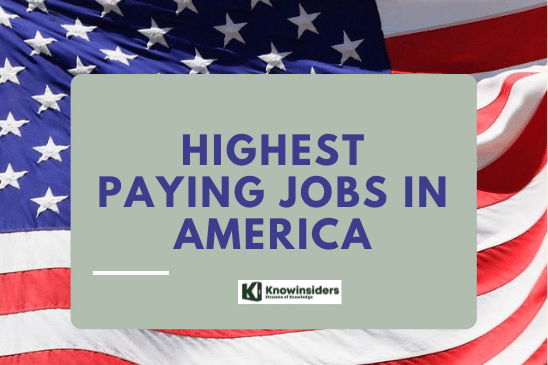 Top 100 Highest Paying Jobs & Careers in the U.S 2021/2022 Top 100 Highest Paying Jobs & Careers in the U.S 2021/2022 High paying salary is one of the most important factors to consider when finding a job. Which are the 100 highest paying jobs in America ... |























